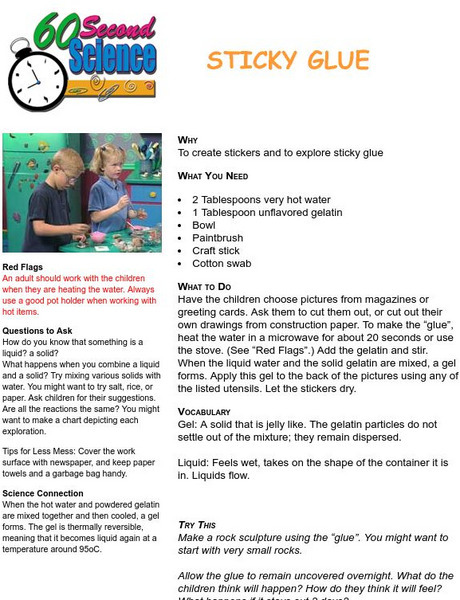Hi, what do you want to do?
Curated OER
Recycling by Composting
Students examine the idea of recycling by composting. Using the internet, they research the benefits of composting to the environment. In groups, they collect numbers on how much food and yard waste is produced in their community. ...
Curated OER
Understanding the Ice
Pupils explore the concept of sea ice. In this sea ice lesson, students interview arctic hunters to regarding the sea ice safety and attributes.
Curated OER
Liquids and Solids
Students describe the properties of solids and liquids, and explain how a semiconductor works. In this atom lesson students demonstrate the bonding properties of carbon and silicon.
Curated OER
The Miracle Fish: Learning to Design an Experiment
Students develop procedures to explore the behavior of fish. In this scientific experiment lesson students from a hypothesis, write a question, identify different variables and controls in their experiment.
Curated OER
Heat 1
For this heat worksheet, students determine the heat gained or lost when matter changes phases. Students review the energy flow through ecosystems by comparing trophic levels and food webs. This worksheet has 10 fill in the blank, 5...
Curated OER
Nothing New? A Physical Change
Fifth graders discuss the differences between chemical and physical changes. In groups, they complete experiments and discover how a physical chnage can be reversed. To end the lesson, they review the steps of the water cycle and...
Curated OER
Literature Collaborative Learning Project
Students, in groups, from Israel study literature in English. They practice communicating in the language and to write poems. They create a website in English describing aspects of their country.
Curated OER
Confucius and Confucianism
Students explore Confucius and his influence on the development o China. They contrast and compare Confucianism to Western philosophy. Classmates observe a video of the biography of Confucius. They video conference with students in...
Curated OER
Liquid Logic: Experiments in Viscosity
Students examine specific characteristics of liquids through a hands-on lab activity. An experiment with teacher prepared viscosity tubes is conducted in which liquid identities are predicted based on data. A hypothesis is written to...
Curated OER
Contaminated Water
Students review and use the steps in the scientific method to complete the experiment. In groups, they research the importance of water to plants and animals in their local area. They examine how water can become contaminated and take...
Curated OER
The Ideal Gas
In this ideal gas worksheet, students read about the conditions necessary for an ideal gas to exist. They also read about the deviations from the ideal gas situation and answer four questions about ideal gases.
Curated OER
Element Videos
Students create videos about an element on the periodic table. In this element lesson, students work with partners to create a 1-2 minute video giving interesting information about their element. They include the name, symbol, atomic...
Curated OER
Solid Water
Students turn solid water (ice) into liquid water. In this solid and liquid water lesson plan, students use water, ice, cups, and heat in order to change water from one state to another. They draw their findings as well.
Curated OER
Nuclear Reactions
In this nuclear reaction worksheet, students determine the missing particle from the reaction and then name that particle. This worksheet has 18 problems to solve.
Curated OER
Moon Journal
Fourth graders observe Moon and its features, and record results both in written form and in a drawing on the given template.
Curated OER
The Human Body
Students explore human growth and development as they participate in class activities, reading and discussion. Worksheet and handouts are included in the lesson.
Curated OER
T-Shirt Chromatography
Students study about chromatography, a process used to separate mixtures. They see that chromatography is used to detect, separate or purify different substances. This nice instructional activity results in a beautiful t-shirt for each...
Curated OER
Colored Clouds
Fourth graders, in groups, examine how particles in warm water move faster than particles in cold water.
Concord Consortium
Concord Consortium: Stem Resources: States of Matter
Using simulations observe what solids, liquids, and gases look like at the atomic scale. After observing the different states of matter at their atomic level, students will be able to conclude about the forces and attractions that exist...
Other
Science Alive: Melting Point Simulation
Percy Julian and Josef Pikl used the fact that melting point-the temperature at which a substance changes from a solid to a liquid-is a characteristic property of a substance to prove that the British chemist Robert Robinson could not...
American Chemical Society
Middle School Chemistry: Moving Molecules in a Solid
Explore the movement of the molecules in a solid.

























